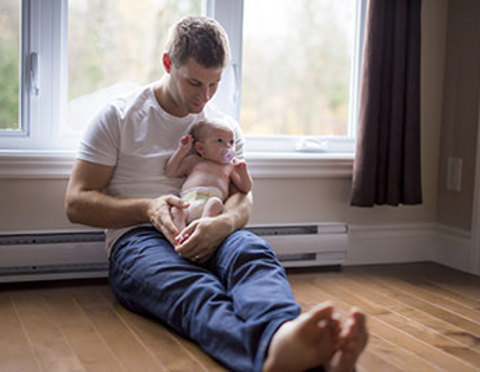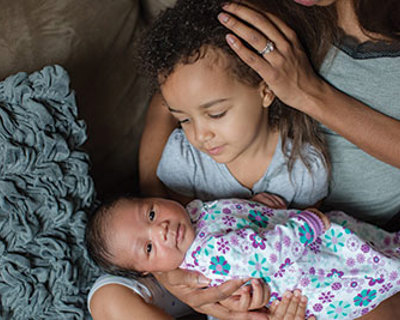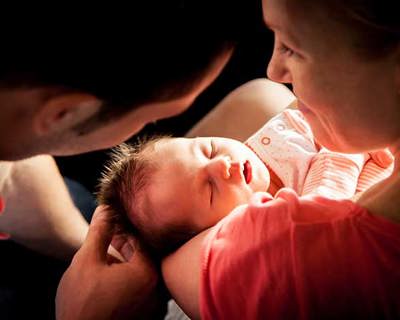Wonderful as having a new baby is, most new parents will tell you it also can turn your life upside down. Babies don't work to a schedule and being available 24/7 can feel incredibly stressful – especially when you are used to being in control of your life.
Making sure you take time for yourself is still important. If you are stressed, your baby could get stressed. When you are calm your baby will pick up on this and learn to calm down too. If you're both calmer it will help make establishing your new routine easier.
Isolation and loneliness
Becoming a parent for the first time will change your lifestyle. With a little one to look after it can be difficult to find time to keep up a social life – at least initially. And even when it is possible to go out, many parents say they’d probably prefer to catch up on sleep.
It can be easy to become isolated so that the world becomes just your baby and you. This can be a problem for couples as well as single parents, especially since one parent will usually be out working. When another parent is at home they will often be providing much-needed support for the parent who is caring for the baby full-time.
Feeling lonely isn’t good for you or your child. It is important to resist the temptation to just stay at home. If you have friends or family nearby, let them know that you’d like to catch up with them.
There are also plenty of local ways for new parents and babies to socialise with others, or to find some support.
You could ask your health visitor, speak to your GP, ring your local council or look on local Facebook pages if you are unsure where to find out about local services for parents and young children.
If you’re finding it hard to seek out company or support, please get in touch with Children 1st Parentline.
Post-natal depression
Mothers can be flooded with messages telling them that becoming a parent is the most fulfilling and wonderful thing that can ever happen. This might come from:
- conversation with friends or family
- posts on social media
- TV, films, magazines and more.
For many new mothers, this is not how they feel. Everyone saying that you should be happy when you're not can make you feel even worse. In severe cases, it may even cause you to feel a failure as a parent before you've properly begun.
Post-natal depression, or 'Baby Blues', is a sadness or depression that emerges in the first year after a baby is born. It is more common than people often think: the NHS says that 1 in 10 mothers (and possibly more) experience post-natal depression. It’s more common in mothers, but new fathers can sometimes suffer post-natal depression too.
It’s hard when you feel depressed to recognise and accept that it’s not your ‘fault.’ It is nothing to be ashamed of. You are not a bad parent and you are not 'going mad': these kinds of thoughts are symptoms of the condition – and help is available.
There are lots of treatments available to help with post-natal depression. If you think you are experiencing post-natal depression or someone close to you such as a partner or your own parent is worried about you, speak to your doctor as soon as possible. They will be able to diagnose you and help you find treatment.
If you’re unsure, or need some support with how you’re feeling, please get in touch. We’ll listen and help you think through the next steps to help you and your family.
Other mental health issues
Although post-natal depression is most common, the anxiety around having a child and the change in lifestyle for new parents might bring on or make existing mental health conditions worse.
If you are concerned in any way about your mental health you should speak to your doctor who will be able to help you. Or if you’d prefer, please contact Children 1st Parentline to talk things through and think about what to do next.

Changes to parents' brains
Adults have more fully formed brains than babies, but our brains are still able to change through life. Changes come through experience and there are few experiences as life-changing as having a child.
Science is starting to show us that there are changes in parents’ brains during the first year after a child is born. Parents are likely to become more emotional – and this can be positive and negative. If you or your partner are feeling overwhelmed, then it might be reassuring to know that it might be as a result of these changes.
'Baby brain'
‘Baby brain’ is often used to describe the mistaken idea that a mum’s brain slows down after a child is born. Common symptoms include: forgetting things, being confused or distracted.
Actually, nothing could be further from the truth! Advances in science show us that the whole of the mum’s brain speeds up. The baby’s needs mean the right side of our brain which deals with emotions has more important tasks to deal with than the ‘practical’ left side.
This means that a mum’s brain rewires to prioritise the needs of her baby, and all of that ‘life admin’ stuff on the left side suddenly has to take a backseat.
Lack of sleep can also be a huge factor for any parents feeling their brains are not quite as sharp as they should be!
Get support
We know that becoming a parent can mean lots of highs and lows. Sometimes it can really help to have someone listen without judging. If a chat and some reassurance would help, please get in touch.


